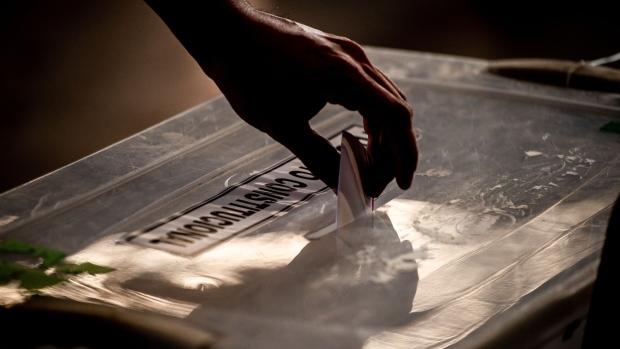Dec 17, 2023
Chile Rejects Second Proposed Constitution as Political Gridlock Worsens
, Bloomberg News

(Bloomberg) -- Chile rejected the second proposal for a new constitution in as many years, prolonging uncertainty and highlighting the failure of the nation’s political system to channel social discontent into a new set of basic laws.
With 99% of votes counted in Sunday’s referendum, 56% rejected the text while 44% backed the document. The result, broadly in line with recent polls, means the current charter from the Augusto Pinochet dictatorship remains in place.
For investors, the vote confirms that the market-friendly rules of one of Latin America’s richest nations will remain intact for now. The outcome could provide some short-term clarity, given that President Gabriel Boric’s administration has promised not to seek a third attempt at a new charter. Still, it fuels broad discontent with politics and represents a huge disappointment for thousands who had taken to the streets for a new constitution.
“Chile’s constitutional process has led to frustration and weariness,” Boric said in a televised speech. “I want to be clear. This vote closes the constitutional process during the rest of my mandate.” He called on all political parties to focus on key legislation such as pension and tax reforms.
Political analysts see the result as troubling for the country’s governance. “It deals a devastating blow to the country’s political class,” said Jennifer Pribble, a professor of political science at the University of Richmond. “Chile’s political parties are seen as out-of-touch with large swaths of society, incapable of effectively channeling citizen demands, connecting and mobilizing voters, and producing a consensus democratic solution to national challenges.”
Chile’s peso was little changed in early trading on Monday after falling as much as 0.2%.
The proposed text, which was drawn up by a right-leaning Constitutional Council, drew scrutiny over its divisiveness. Detractors said the new constitution would have jeopardized Chile’s limited abortion rights and entrenched the private sector’s power in areas like healthcare and education to the detriment of poor families. It was also criticized for falling short in its protection of the environment and workers’ rights.
Meanwhile, supporters said it would have sparked economic growth and provided needed help in controlling clandestine migration and fighting crime.
“There’s nothing to celebrate,” Jose Antonio Kast, whose Partido Republicano was the largest party in the Constitutional Council, said in televised remarks. “We failed in our efforts to convince the Chilean people that it was a better charter than the one we have currently.”
While opinion surveys released in the weeks before Sunday’s vote had indicated rising support for the new text, they consistently showed a greater percentage of voters inclined to reject the proposal.
Policy Uncertainty
Last week, Fitch Ratings Inc. reaffirmed Chile’s sovereign credit rating and dismissed concerns that the referendum on a new constitution would lead to changes in the nation’s economic model.
Still, Chile watchers warn the rejection keeps risks of more social unrest alive. Some analysts don’t rule out another push for a new constitution further on, with debate likely heating up before the 2025 presidential election.
“Market response is likely to be negative,” said Andres Perez, chief economist for Latin America at Banco Itau. “Although markets are likely to have had rejection as their base scenario, the likelihood of future calls for a new process or relevant constitutional modifications will maintain economic policy uncertainty above pre-social crisis levels, especially affecting large scale investment projects.”
Last year, Chileans rejected a separate charter drawn up largely by leftists and independents that was criticized for the radical changes it would have entailed. Some of its most controversial proposals included the elimination of the Senate and the creation of a parallel justice system for indigenous communities.
The process of drafting a new charter came in response to widespread social unrest starting in late 2019. At that point, an increase in subway fares evolved into broader demands to fight inequality, improve public services and reform the country’s political system. It also sparked riots and arson attacks.
“This is something that’s been negative for the country above all because we ended up with the same constitution that everyone said was a problem,” said Kenneth Bunker, a professor at Universidad San Sebastian in Santiago. “For anyone who thinks the country’s stability and guarantees are going to return, I don’t believe this will happen.”
(Updates with peso move in sixth paragraph)
©2023 Bloomberg L.P.








